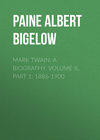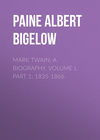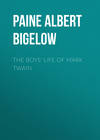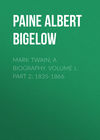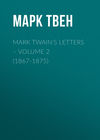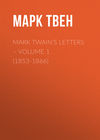Kitabı oku: «Mark Twain: A Biography. Volume II, Part 1: 1886-1900», sayfa 8
CXXVI
"A TRAMP ABROAD"
'A Tramp Abroad' came from the presses on the 13th of March, 1880. It had been widely heralded, and there was an advance sale of twenty-five thousand copies. It was of the same general size and outward character as the Innocents, numerously illustrated, and was regarded by its publishers as a satisfactory book.
It bore no very striking resemblance to the Innocents on close examination. Its pictures-drawn, for the most part, by a young art student named Brown, whom Clemens had met in Paris—were extraordinarily bad, while the crude engraving process by which they had been reproduced; tended to bring them still further into disrepute. A few drawings by True Williams were better, and those drawn by Clemens himself had a value of their own. The book would have profited had there been more of what the author calls his "works of art."
Mark Twain himself had dubious anticipations as to the book's reception.
But Howells wrote:
Well, you are a blessing. You ought to believe in God's goodness, since he has bestowed upon the world such a delightful genius as yours to lighten its troubles.
Clemens replied:
Your praises have been the greatest uplift I ever had. When a body is not even remotely expecting such things, how the surprise takes the breath away! We had been interpreting your stillness to melancholy and depression, caused by that book. This is honest. Why, everything looks brighter now. A check for untold cash could not have made our hearts sing as your letter has done.
A letter from Tauchnitz, proposing to issue an illustrated edition in Germany, besides putting it into his regular series, was an added satisfaction. To be in a Tauchnitz series was of itself a recognition of the book's merit.
To Twichell, Clemens presented a special copy of the Tramp with a personal inscription, which must not be omitted here:
MY DEAR "HARRIS"—NO, I MEAN MY DEAR JOE,—Just imagine it for a moment: I was collecting material in Europe during fourteen months for a book, and now that the thing is printed I find that you, who were with me only a month and a half of the fourteen, are in actual presence (not imaginary) in 440 of the 531 pages the book contains! Hang it, if you had stayed at home it would have taken me fourteen years to get the material. You have saved me an intolerable whole world of hated labor, and I'll not forget it, my boy.
You'll find reminders of things, all along, that happened to us, and of others that didn't happen; but you'll remember the spot where they were invented. You will see how the imaginary perilous trip up the Riffelberg is preposterously expanded. That horse-student is on page 192. The "Fremersberg" is neighboring. The Black Forest novel is on page 211. I remember when and where we projected that: in the leafy glades with the mountain sublimities dozing in the blue haze beyond the gorge of Allerheiligen. There's the "new member," page 213; the dentist yarn, 223; the true Chamois, 242; at page 248 is a pretty long yarn, spun from a mighty brief text meeting, for a moment, that pretty girl who knew me and whom I had forgotten; at 281 is "Harris," and should have been so entitled, but Bliss has made a mistake and turned you into some other character; 305 brings back the whole Rigi tramp to me at a glance; at 185 and 186 are specimens of my art; and the frontispiece is the combination which I made by pasting one familiar picture over the lower half of an equally familiar one. This fine work being worthy of Titian, I have shed the credit of it upon him. Well, you'll find more reminders of things scattered through here than are printed, or could have been printed, in many books.
All the "legends of the Neckar," which I invented for that unstoried region, are here; one is in the Appendix. The steel portrait of me is just about perfect.
We had a mighty good time, Joe, and the six weeks I would dearly like to repeat any time; but the rest of the fourteen months-never.
With love,
Yours, MARK.
Hartford, March 16, 1880.
Possibly Twichell had vague doubts concerning a book of which he was so large a part, and its favorable reception by the critics and the public generally was a great comfort. When the Howells letter was read to him he is reported as having sat with his hands on his knees, his head bent forward—a favorite attitude—repeating at intervals:
"Howells said that, did he? Old Howells said that!"
There have been many and varying opinions since then as to the literary merits of 'A Tramp Abroad'. Human tastes differ, and a "mixed" book of this kind invites as many opinions as it has chapters. The word "uneven" pretty safely describes any book of size, but it has a special application to this one. Written under great stress and uncertainty of mind, it could hardly be uniform. It presents Mark Twain at his best, and at his worst. Almost any American writer was better than Mark Twain at his worst: Mark Twain at his best was unapproachable.
It is inevitable that 'A Tramp Abroad' and 'The Innocents Abroad' should be compared, though with hardly the warrant of similarity. The books are as different as was their author at the periods when they were written. 'A Tramp Abroad' is the work of a man who was traveling and observing for the purpose of writing a book, and for no other reason. The Innocents Abroad was written by a man who was reveling in every scene and experience, every new phase and prospect; whose soul was alive to every historic association, and to every humor that a gay party of young sight-seers could find along the way. The note-books of that trip fairly glow with the inspiration of it; those of the later wanderings are mainly filled with brief, terse records, interspersed with satire and denunciation. In the 'Innocents' the writer is the enthusiast with a sense of humor. In the 'Tramp' he has still the sense of humor, but he has become a cynic; restrained, but a cynic none the less. In the 'Innocents' he laughs at delusions and fallacies—and enjoys them. In the 'Tramp' he laughs at human foibles and affectations—and wants to smash them. Very often he does not laugh heartily and sincerely at all, but finds his humor in extravagant burlesque. In later life his gentler laughter, his old, untroubled enjoyment of human weakness, would return, but just now he was in that middle period, when the "damned human race" amused him indeed, though less tenderly. (It seems proper to explain that in applying this term to mankind he did not mean that the race was foredoomed, but rather that it ought to be.)
Reading the 'Innocents', the conviction grows that, with all its faults, it is literature from beginning to end. Reading the 'Tramp', the suspicion arises that, regardless of technical improvement, its percentage of literature is not large. Yet, as noted in an earlier volume, so eminent a critic as Brander Matthews has pronounced in its favor, and he undoubtedly had a numerous following; Howells expressed. his delight in the book at the time of its issue, though one wonders how far the personal element entered into his enjoyment, and what would be his final decision if he read the two books side by side to-day. He reviewed 'A Tramp Abroad' adequately and finely in the Atlantic, and justly; for on the whole it is a vastly entertaining book, and he did not overpraise it.
'A Tramp Abroad' had an "Introduction" in the manuscript, a pleasant word to the reader but not a necessary one, and eventually it was omitted. Fortunately the appendix remained. Beyond question it contains some of the very best things in the book. The descriptions of the German Portier and the German newspaper are happy enough, and the essay on the awful German language is one of Mark Twain's supreme bits of humor. It is Mark Twain at his best; Mark Twain in a field where he had no rival, the field of good-natured, sincere fun-making-ridicule of the manifest absurdities of some national custom or institution which the nation itself could enjoy, while the individual suffered no wound. The present Emperor of Germany is said to find comfort in this essay on his national speech when all other amusements fail. It is delicious beyond words to express; it is unique.
In the body of the book there are also many delights. The description of the ant might rank next to the German language almost in its humor, and the meeting with the unrecognized girl at Lucerne has a lively charm.
Of the serious matter, some of the word-pictures are flawless in their beauty; this, for instance, suggested by the view of the Jungfrau from Interlaken:
There was something subduing in the influence of that silent and solemn and awful presence; one seemed to meet the immutable, the indestructible, the eternal, face to face, and to feel the trivial and fleeting nature of his own existence the more sharply by the contrast. One had the sense of being under the brooding contemplation of a spirit, not an inert mass of rocks and ice—a spirit which had looked down, through the slow drift of ages, upon a million vanished races of men and judged them; and would judge a million more—and still be there, watching unchanged and unchangeable, after all life should be gone and the earth have become a vacant desolation While I was feeling these things, I was groping, without knowing it, toward an understanding of what the spell is which people find in the Alps, and in no other mountains; that strange, deep, nameless influence which, once felt, cannot be forgotten; once felt, leaves always behind it a restless longing to feel it again—a longing which is like homesickness; a grieving, haunting yearning, which will plead, implore, and persecute till it has its will. I met dozens of people, imaginative and unimaginative, cultivated and uncultivated, who had come from far countries and roamed through the Swiss Alps year after year—they could not explain why. They had come first, they said, out of idle curiosity, because everybody talked about it; they had come since because they could not help it, and they should keep on coming, while they lived, for the same reason; they had tried to break their chains and stay away, but it was futile; now they had no desire to break them. Others came nearer formulating what they felt; they said they could find perfect rest and peace nowhere else when they were troubled: all frets and worries and chafings sank to sleep in the presence of the benignant serenity of the Alps; the Great Spirit of the mountain breathed his own peace upon their hurt minds and sore hearts, and healed them; they could not think base thoughts or do mean and sordid things here, before the visible throne of God.
Indeed, all the serious matter in the book is good. The reader's chief regret is likely to be that there is not more of it. The main difficulty with the humor is that it seems overdone. It is likely to be carried too far, and continued too long. The ascent of Riffelberg is an example. Though spotted with delights it seems, to one reader at least, less admirable than other of the book's important features, striking, as it does, more emphatically the chief note of the book's humor—that is to say, exaggeration.
Without doubt there must be many—very many—who agree in finding a fuller enjoyment in 'A Tramp Abroad' than in the 'Innocents'; only, the burden of the world's opinion lies the other way. The world has a weakness for its illusions: the splendor that falls on castle walls, the glory of the hills at evening, the pathos of the days that are no more. It answers to tenderness, even on the page of humor, and to genuine enthusiasm, sharply sensing the lack of these things; instinctively resenting, even when most amused by it, extravagance and burlesque. The Innocents Abroad is more soul-satisfying than its successor, more poetic; more sentimental, if you will. The Tramp contains better English usage, without doubt, but it is less full of happiness and bloom and the halo of romance. The heart of the world has felt this, and has demanded the book in fewer numbers.—[The sales of the Innocents during the earlier years more than doubled those of the Tramp during a similar period. The later ratio of popularity is more nearly three to one. It has been repeatedly stated that in England the Tramp has the greater popularity, an assertion not sustained by the publisher's accountings.]
CXXVII
LETTERS, TALES, AND PLANS
The reader has not failed to remark the great number of letters which Samuel Clemens wrote to his friend William Dean Howells; yet comparatively few can even be mentioned. He was always writing to Howells, on every subject under the sun; whatever came into his mind —business, literature, personal affairs—he must write about it to Howells. Once, when nothing better occurred, he sent him a series of telegrams, each a stanza from an old hymn, possibly thinking they might carry comfort.—["Clemens had then and for many years the habit of writing to me about what he was doing, and still more of what he was experiencing. Nothing struck his imagination, in or out of the daily routine, but he wished to write me of it, and he wrote with the greatest fullness and a lavish dramatization, sometimes to the length of twenty or forty pages:" (My Mark Twain, by W. D. Howells.)] Whatever of picturesque happened in the household he immediately set it down for Howells's entertainment. Some of these domestic incidents carry the flavor of his best humor. Once he wrote:
Last night, when I went to bed, Mrs. Clemens said, "George didn't take the cat down to the cellar; Rosa says he has left it shut up in the conservatory." So I went down to attend to Abner (the cat). About three in the morning Mrs. C. woke me and said, "I do believe I hear that cat in the drawing-room. What did you do with him?" I answered with the confidence of a man who has managed to do the right thing for once, and said, "I opened the conservatory doors, took the library off the alarm, and spread everything open, so that there wasn't any obstruction between him and the cellar." Language wasn't capable of conveying this woman's disgust. But the sense of what she said was, "He couldn't have done any harm in the conservatory; so you must go and make the entire house free to him and the burglars, imagining that he will prefer the coal-bins to the drawing-room. If you had had Mr. Howells to help you I should have admired, but not have been astonished, because I should know that together you would be equal to it; but how you managed to contrive such a stately blunder all by yourself is what I cannot understand."
So, you see, even she knows how to appreciate our gifts….
I knocked off during these stirring hours, and don't intend to go to work again till we go away for the summer, four or six weeks hence. So I am writing to you, not because I have anything to say, but because you don't have to answer and I need something to do this afternoon.
The rightful earl has–
Friday, 7th.
Well, never mind about the rightful earl; he merely wanted to-borrow money. I never knew an American earl that didn't.
After a trip to Boston, during which Mrs. Clemens did some bric-a-brac shopping, he wrote:
Mrs. Clemens has two imperishable topics now: the museum of andirons which she collected and your dinner. It is hard to tell which she admires the most. Sometimes she leans one way and sometimes the other; but I lean pretty steadily toward the dinner because I can appreciate that, whereas I am no prophet in andirons. There has been a procession of Adams Express wagons filing before the door all day delivering andirons.
In a more serious vein he refers to the aged violinist Ole Bull and his wife, whom they had met during their visit, and their enjoyment of that gentle-hearted pair.
Clemens did some shorter work that spring, most of which found its way into the Atlantic. "Edward Mills and George Benton," one of the contributions of this time, is a moral sermon in its presentation of a pitiful human spectacle and misdirected human zeal.
It brought a pack of letters of approval, not only from laity, but the church, and in some measure may have helped to destroy the silly sentimentalism which manifested itself in making heroes of spectacular criminals. That fashion has gone out, largely. Mark Twain wrote frequently on the subject, though never more effectively than in this particular instance. "Mrs. McWilliams and the Lightning" was another Atlantic story, a companion piece to "Mrs. McWilliams's Experience with the Membranous Croup," and in the same delightful vein—a vein in which Mark Twain was likely to be at his best—the transcription of a scene not so far removed in character from that in the "cat" letter just quoted: something which may or may not have happened, but might have happened, approximately as set down. Rose Terry Cooke wrote:
Horrid man, how did you know the way I behave in a thunderstorm? Have you been secreted in the closet or lurking on the shed roof? I hope you got thoroughly rained on; and worst of all is that you made me laugh at myself; my real terrors turned round and grimaced at me: they were sublime, and you have made them ridiculous just come out here another year and have four houses within a few rods of you struck and then see if you write an article of such exasperating levity. I really hate you, but you are funny.
In addition to his own work, he conceived a plan for Orion. Clemens himself had been attempting, from time to time, an absolutely faithful autobiography; a document in which his deeds and misdeeds, even his moods and inmost thoughts, should be truly set down. He had found it an impossible task. He confessed freely that he lacked the courage, even the actual ability, to pen the words that would lay his soul bare, but he believed Orion equal to the task. He knew how rigidly honest he was, how ready to confess his shortcomings, how eager to be employed at some literary occupation. It was Mark Twain's belief that if Orion would record in detail his long, weary struggle, his succession of attempts and failures, his past dreams and disappointments, along with his sins of omission and commission, it would make one of those priceless human documents such as have been left by Benvenuto Cellini, Cazenova, and Rousseau.
"Simply tell your story to yourself," he wrote, "laying all hideousness utterly bare, reserving nothing. Banish the idea of the audience and all hampering things."
Orion, out in Keokuk, had long since abandoned the chicken farm and a variety of other enterprises. He had prospected insurance, mining, journalism, his old trade of printing, and had taken down and hung up his law shingle between each of these seizures. Aside from business, too, he had been having a rather spectacular experience. He had changed his politics three times (twice in one day), and his religion as many more. Once when he was delivering a political harangue in the street, at night, a parade of the opposition (he had but just abandoned them) marched by carrying certain flaming transparencies, which he himself had made for them the day before. Finally, after delivering a series of infidel lectures; he had been excommunicated and condemned to eternal flames by the Presbyterian Church. He was therefore ripe for any new diversion, and the Autobiography appealed to him. He set about it with splendid enthusiasm, wrote a hundred pages or so of his childhood with a startling minutia of detail and frankness, and mailed them to his brother for inspection.
They were all that Mark Twain had expected; more than he had expected. He forwarded them to Howells with great satisfaction, suggesting, with certain excisions, they be offered anonymously to the Atlantic readers.
But Howells's taste for realism had its limitations. He found the story interesting—indeed, torturingly, heart-wringingly so—and, advising strongly against its publication, returned it.
Onion was steaming along at the rate of ten to twenty pages a day now, forwarding them as fast as written, while his courage was good and the fires warm. Clemens, receiving a package by every morning mail, soon lost interest, then developed a hunted feeling, becoming finally desperate. He wrote wildly to shut Orion off, urging him to let his manuscript accumulate, and to send it in one large consignment at the end. This Orion did, and it is fair to say that in this instance at least he stuck to his work faithfully to the bitter, disheartening end. And it would have been all that Mark Twain had dreamed it would be, had Orion maintained the simple narrative spirit of its early pages. But he drifted off into theological byways; into discussions of his excommunication and infidelities, which were frank enough, but lacked human interest.
In old age Mark Twain once referred to Orion's autobiography in print and his own disappointment in it, which he attributed to Orion's having departed from the idea of frank and unrestricted confession to exalt himself as a hero-a statement altogether unwarranted, and due to one of those curious confusions of memory and imagination that more than once resulted in a complete reversal of the facts. A quantity of Orion's manuscript has been lost and destroyed, but enough fragments of it remain to show its fidelity to the original plan. It is just one long record of fleeting hope, futile effort, and humiliation. It is the story of a life of disappointment; of a man who has been defeated and beaten down and crushed by the world until he has nothing but confession left to surrender.—[Howells, in his letter concerning the opening chapters, said that they would some day make good material. Fortunately the earliest of these chapters were preserved, and, as the reader may remember, furnished much of the childhood details for this biography.]
Whatever may have been Mark Twain's later impression of his brother's manuscript, its story of failure and disappointment moved him to definite action at the time.
Several years before, in Hartford, Orion had urged him to make his publishing contracts on a basis of half profits, instead of on the royalty plan. Clemens, remembering this, had insisted on such an arrangement for the publication of 'A Tramp Abroad', and when his first statement came in he realized that the new contract was very largely to his advantage. He remembered Orion's anxiety in the matter, and made it now a valid excuse for placing his brother on a firm financial footing.
Out of the suspicions which you bred in me years ago has grown this result, to wit: that I shall within the twelve months get $40,000 out of this Tramp, instead of $20,000. $20,000, after taxes and other expenses are stripped away, is worth to the investor about $75 a month, so I shall tell Mr. Perkins [his lawyer and financial agent] to make your check that amount per month hereafter…. This ends the loan business, and hereafter you can reflect that you are living not on borrowed money, but on money which you have squarely earned, and which has no taint or savor of charity about it, and you can also reflect that the money which you have been receiving of me is charged against the heavy bill which the next publisher will have to stand who gets a book of mine.
From that time forward Orion Clemens was worth substantially twenty thousand dollars—till the day of his death, and, after him, his widow. Far better was it for him that the endowment be conferred in the form of an income, than had the capital amount been placed in his hands.
